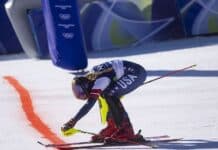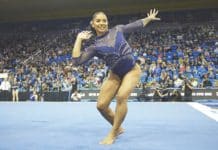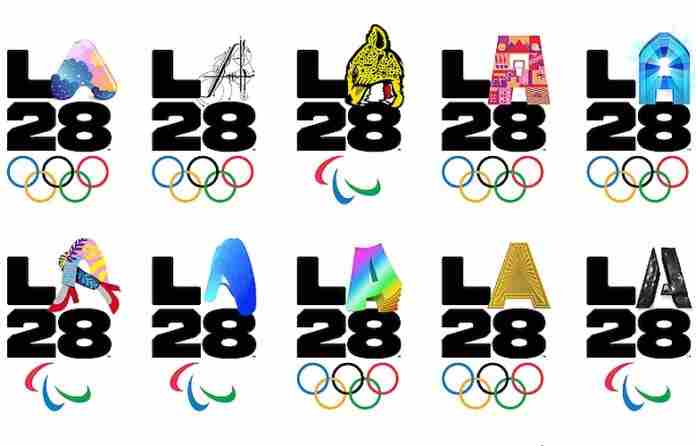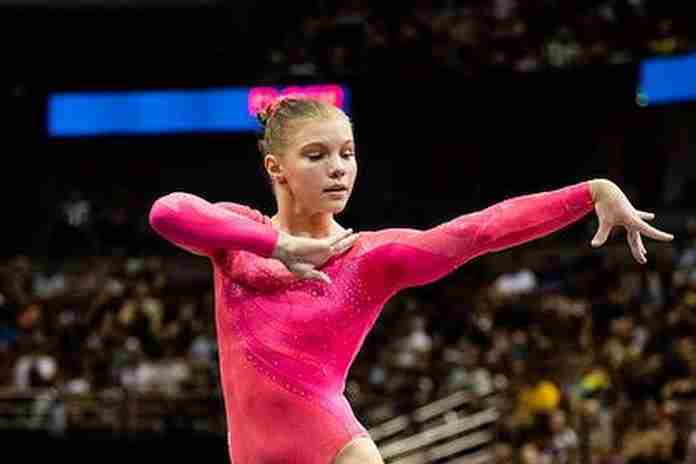★ The Sports Examiner: Surveying, monitoring and explaining the key competitive, economic and political forces shaping elite sport and the Olympic Movement. ★
★ Want TheSportsExaminer.com insights for your team? Yes! Click here for info on speaking, research and consulting from editor Rich Perelman. ★
★ To get our new, exclusive 951-event International Sports Calendar for 2022-23 and beyond, click here! ★
★ To get The Sports Examiner by e-mail: sign up here! ★
≡ THE 5-RING CIRCUS ≡
1. Brazil’s Andrade wins Worlds All-Around; U.S.’s Jones gets silver
2. LA28’s canoe slalom venue on the move to Oklahoma?
3. North Carolina touts no construction in World University Games bid
4. World Champs Gebreslase and Obiri clash in NYC Marathon Sunday
5. Modern pentathlon athlete survey favors retaining riding by 86-9%
Brazil’s Rebeca Andrade was the favorite in the women’s all-Around at the FIG World Artistic Championships and won her country’s first gold in the event, edging American Shilese Jones and Britain’s Jessica Gadirova. A short note in a report to the International Canoe Federation Congress in Thailand indicates that the Canoe Slalom competitions for the 2028 Olympic Games – in Los Angeles – may be moved to Oklahoma City! In the fight to host the 2027 World University Games, the North Carolina bid from the U.S. circulated a poster which emphasized the enormous U.S. collegiate sports market, that 13 colleges and universities will be involved in hosting the Games and that no construction is needed for either the competition venues or the athlete villages! The decision comes on 12 November. The TCS New York City Marathon comes on Sunday, with 2022 World Champion Gotytom Gebreslase of Ethiopia leading the women’s field, but many are focused on Kenyan star (and three-time World Champion) Hellen Obiri, making her marathon debut at 32. An open, online survey of active modern pentathletes has received 335 replies over eight days, with the respondents – aged 15 to 35 – preferring retaining riding in its current form or with reforms for better safety, by 86-9% over obstacle-course racing. One respondent, however, suggested eliminating riding and retaining just the four remaining disciplines!
1.
Brazil’s Andrade wins Worlds All-Around; U.S.’s Jones gets silver
After a silver medal at the Tokyo Olympic Games in 2021, Brazil’s Rebeca Andrade led the qualifying round at 57.332 and was a solid favorite to win the FIG World Artistic Championships All-Around gold in Liverpool.
She had to wait until the very end of the session, but with a solid 14.400 score on Floor, she completed a gold-medal performance, scoring 56.899 to best American Shilese Jones (55.399) and Britain’s home favorite, Jessica Gadirova (55.199) in Thursday’s All-Around final.
Consistency was the key, as Andrade posted the top score on Vault (15.166) and then the third-best scores on Uneven Bars (13.800) and Beam (13.533) to enter the final event with a 0.80-point lead on Jones, 42.499-41.699. They had been the top two in the qualifying round, with American Jade Carey third, but British stars Alice Kinsella (40.899) and Gadirova (40.799) were standing 3-4, with Carey sixth (40.532).
Gadirova posted the top score on Floor at 14.400 when Andrade came up for her routine, needing only a 12.900 to pass Jones, sitting at 55.399 after a modest 13.700 on floor. No problem for the 23-year-old Brazilian, in her third World Championships, as she also scored 14.400 to tie Gadirova, but was placed second due to a lower execution score: 8.40 to 8.30.
It was Andrade’s third career Worlds medal, with apparatus medals in 2021 on Vault (gold) and Uneven Bars (silver). This was Brazil’s second-ever Worlds medal in the women’s All-Around and first win; Jade Barbosa had tied for the 2007 bronze. And Andrade is set to chase more medals in the apparatus finals in the Uneven Bars, Beam and Floor.
For the U.S.’s Jones, her Worlds silver extends the American streak of a medal in the women’s All-Around to 15 straight World Championships, stretching back to 2003. It’s a meteoric rise for Jones, only 12th at the 2019 and 2021 U.S. Nationals, but second this year and national champ on the Bars and Floor. She’s qualified for the apparatus final on the Uneven Bars.
The individual apparatus leaders were Andrade on Vault (15.166), Jones on Bars (14.366), Yushan Ou (CHN) on Beam at 13.866 and Gadirova and Andrade, who both scored 14.400 on Floor.
Carey was strong as usual on Vault (second) and Floor (third), but could not match her qualifying scores on Bars (15th) or Beam (11th). She qualified for the Vault and Floor apparatus finals.
The Worlds continue with the men’s All-Around on Friday and then the apparatus finals on the weekend.
2.
LA28’s canoe slalom venue on the move to Oklahoma?
The venue line-up for the 2028 Olympic Games in Los Angeles continues to shift, with the International Canoe Federation reporting to its 2022 Congress in Pattaya (THA) that the Canoe Slalom competition could be moved out of California altogether.
The ICF Canoe Slalom committee report by Jean-Michel Prono (FRA) was primarily concerned with the forthcoming schedule, new events and getting past the pandemic, but also reported:
“Los Angeles 2028 CSL venue to be secured currently working on an existing ‘offset venue’ option, Oklahoma”
(Prono may have meant “off-site” rather than “offset,” but this is a direct quote from the report.)
That would be the well-known and highly-respected Riversport Rapids whitewater center in Oklahoma City, Oklahoma, already selected as the site for the 2026 ICF World Canoe Slalom Championships. The facility has hosted the ICF Canoe Sprint Super Cup in 2021 and did so again in 2022.
The LA28 bid showed the canoe slalom site as a temporary facility in the Sepulveda Basin Recreation Area, along with sites for equestrian and shooting. The site for canoe sprint races has already been moved from the originally proposed Lake Perris in Riverside County (inland from Los Angeles) to the Long Beach Marine Stadium, used for the 1932 Olympic Games. It will also be the site for rowing, although on a shortened, 1,500 m course due to the existing 2nd Street Bridge.
The 1984 Olympic Games venue for canoeing and rowing was at Lake Casitas in Ventura County, north of Los Angeles, but not proposed for 2028.
Under section 6.6 of the December 2021 Games Agreement with the City of Los Angeles, the LA28 organizers (“OCOG” below) will be required to obtain the approval of the City to move a sport out of the City proper, which would apply to the canoe slalom events:
“The Parties acknowledge, agree, and anticipate that, given the 2028 Games events are not scheduled to take place until 2028 and given that the Los Angeles region continues to add to its already expansive inventory of world class sports venues, relocating a competition event may benefit the presentation of the 2028 Games. Prior to relocating certain Olympic events (a “Certain Event”), the OCOG shall inform the City and obtain its written consent (which shall not be unreasonably withheld, conditioned, or delayed) if such relocation both moves a Certain Event out of the City and constitutes an amendment to the venue plan submitted to the City on January 18, 2017. For purposes of this Section 6.6, the following are Certain Events: any competition event to be held at a venue located in the City, the Media Village, and the Athletes Village.”
3.
North Carolina touts no construction in
World University Games bid
After the Chungcheong Megacity bid committee for the 2027 World University Games circulated its “closing argument” for its candidature via the popular InsideTheGames site, the competing North Carolina bid did the same.
Where the Koreans touted government funding promises of €440 million (~$429.2 million U.S.) to help finance the Games and build venues – 10 new sites are proposed – the North Carolina concept emphasizes building … nothing:
● The athlete villages will be located at the existing student residences at the University of North Carolina Chapel Hill and the University of North Carolina Greensboro.
● No venue construction is anticipated, as existing sites are already in place such as the Greensboro Coliseum, the Greensboro Aquatic Center, the WakeMed Soccer Park and the famous indoor arenas Cameron Indoor Stadium (Duke University), Dean Smith Center at UNC Chapel Hill and PNC Arena at North Carolina State.
● The proposed 2027 program area includes 19 college and universities (!) with 13 directly involved in the staging of the University Games, with more than 260,000 students.
The circular also made the point about the opportunity available in the American market:
“[T]he collegiate sports market in the USA has exploded, and is, by a large margin, the number one college and university sports market in the world. Dan Guerrero, President of the U.S. International University Sports Federation (USIUSF), a World University Games athlete in Baseball in the 1970 Games in Torino, Italy, and former long-time athletic director at UCLA, emphasized, ‘The United States collegiate and university sports market is the world leader in a number of categories: we are Number 1 in sports venues and facilities; in sports sponsorships; in sports broadcasting; in annual spending on college sports; in sports marketing, promotions, and advertising; and, importantly, in fan support.’”
The International University Sports Federation (FISU) is expected to choose between the two on 12 November.
4.
World Champs Gebreslase and Obiri clash in NYC Marathon Sunday
Cloudy skies and temperatures in the 60s are expected for Sunday’s TCS New York City Marathon, with a long-anticipated debut marathon from Kenyan star Hellen Obiri to challenge 2022 World Champion Gotytom Gebreslase of Ethiopia.
The race is one of the richest in the world, with $267,000 each for men and women for the top 10 placers: $100,000-60,000-40,000-25,000-15,000-10,000-7,500-5,000-2,500-2,000. There is an additional prize for the top Americans, of $25,000-15,000-10,000-5,000-3,000 to the top five.
The top women’s entries, shown with lifetime bests (and year):
● 2:17:45 (2020) Lonah Salpeter (ISR) ~ 2022 Worlds bronze medalist
● 2:18:11 (2022) Gotytom Gebreslase (ETH) ~ 2022 World Champion
● 2:19:12 (2022) Keira D’Amato (USA) ~ 2022 Worlds eighth
● 2:19:50 (2012) Edna Kiplagat (KEN) ~ 2011 & 2013 World Champion
● 2:22:28 (2011) Des Linden (USA) ~ 2018 Boston Marathon winner
● 2:22:29 (2022) Mao Uesugi (JPN) ~ 2022 Osaka Marathon runner-up
● 2:22:28 (2021) Viola Cheptoo (KEN) ~ New York runner-up in 2021
● 2:23:18 (2022) Emma Bates (USA) ~ 2022 Worlds seventh
Kenya’s Obiri, 32, has been threatening to run a marathon for several years and her debut has been anticipated since her brilliant 2019 World Cross Country Championship gold. She owns World 5,000 m wins from 2017 and 2019 and Olympic silvers from 2016 and 2020 (2021). She won the silver at the 2022 Worlds 10,000 m in Eugene this past summer, so what will she do?
Americans to watch beyond former American Record holder D’Amato, Linden and Bates are 2020 Olympic Marathon Trials winner Aliphine Tuliamuk (best of 2:26:50 from 2019) and Stephanie Bruce (2:27:47 from 2019).
The top men’s entries:
● 2:03:00 (2020) Evans Chebet (KEN) ~ 2022 Boston Marathon winner
● 2:04:49 (2018) Shura Kitata (ETH) ~ 2020 London Marathon winner
● 2:04:51 (2022) Daniel Do Nascimiento (BRA) ~ 2022 Worlds eighth
● 2:04:56 (2022) Abdi Nageeye (NED) ~ Tokyo 2020 Olympic silver
● 2:05:29 (2020) Suguru Osako (JPN) ~ Third at Boston ‘17, Chicago ‘18
● 2:06:07 (2018) Galen Rupp (USA) ~ Rio 2016 Olympic bronze
● 2:06:38 (2022) Tadesse Abraham (SUI) ~ 2018 European Champs silver
● 2:06:55 (2022) Mohamed El Aaraby (MAR) ~ 2021 NYC Marathon runner-up
Defending champion Albert Korir (KEN: best of 2:08:03 in 2019) is also entered; he’s trying to become the first repeat winner since countryman Geoffrey Mutai did it in 2011-13 (Hurricane Sandy wiped out the 2012 race).
There is a strong American contingent, including three-time U.S. Half Marathon champ Leonard Korir (2:07:56 in 2019), Scott Fauble (2:08:52 in 2022), five-time Olympian Abdi Abdirahman (2:08:56 in 2006) and Rio 2016 sixth-placer Jared Ward (2:09:25 in 2019). Making his marathon debut will be 2016 Olympian Shadrack Kipchirchir, fourth at the 2022 New York City Half Marathon in 1:01.16.
There’a also a $50,000 bonus for a race record, currently 2:05:06 for the men (Mutai/KEN, 2011) and 2:22:31 for the women (Margaret Okayo/KEN, 2003)
The race will be shown nationally on ESPN2 from 8:30-11:30 a.m. Eastern time on Sunday, with John Anderson and Sage Steele hosting and a bevy of analysts and reporters on the course.
5.
Modern pentathlon athlete survey favors retaining riding
by 86-9% over obstacle
The latest campaign in the fight for the future of modern pentathlon is an online survey, offered since 28 October, asking registered pentathletes aged 15-35 about their view of the sport’s fifth discipline.
Through noon Pacific time on 3 November – that’s almost eight days of survey – there have been 335 responses from 40 countries:
● The raw totals showed 182 in favor of keeping riding, but with new rules (54.3%), 106 in favor of keeping riding as it is now (31.6%), 32 in favor of the Ninja-style obstacle course as proposed (9.0%).
● There were 13 who had no opinion, one who preferred to eliminate riding and not replace it (quadrathlon?) and one who preferred skateboarding as the new fifth discipline!
Of the 335 respondents, 153 were from the senior division (over 21: 45.7%), 78 were juniors (19-21: 23.3%), 56 were U-19s (17-18: 16.7%) and 48 were U17s (15-16: 14.3%). That means that the sub-senior vote in the survey (so far) was 54.3%, an interesting barometer of athletes with their careers ahead of them. .
There were plenty of comments, mostly very short, but also including:
● “Change is a Must! But after what I saw in the new Obstacle-Run discipline test, lucidly, this isn’t modern pentathlon. … I fully respect the Obstacle-Run sport but we aren’t ninjas. Our sport is built for different and specific people. Unique ones.”
● “The sport will not be the same without riding involved. I will no longer continue competing at international level if riding is removed.”
● “I love riding and am gutted to see it lost from our sport but a change is absolutely necessary and stated by the IOC. Riding is not viable and we must adapt to survive.“
The UIPM Congress will meet to discuss this and other issues online on 12-13 November.
≡ PANORAMA ≡
● International Federations ● Further to Thursday’s story on the publication of the actual amounts distributed by the International Olympic Committee to the summer International Federations, German journalist Jens Weinreich, an active observer of money in international sport noted in an e-mail message:
“The most important point, and ASOIF doesn’t say anything about it, nor do you, is this: the original plan/budget was to distribute $590m, not just $540m as in Rio.
“When ASOIF decided on the new distribution and the new amounts in Brisbane in May 2019, $50m more was also planned and was budgeted accordingly by the Olympic IFs.
“Group A expected $40m across the board, Group B $25.95m each, Group C $18.60m, Group D $16.30m and Group E $14.10m. These were increases of between 8.5 and 17.3 per cent depending on the IF grading.
“So you see, depending on the classification, the individual federations received between 1 and 8.5 million USD less from the IOC than they had expected three years ago.
“I’m surprised myself that it’s now only $540m, I just assume that the cut is justified by the consequences of the pandemic.”
● Russia ● A bill was introduced in the Russian State Duma, the national legislature, “to overturn the decisions of the Court of Arbitration for Sport (CAS), which makes unfair decisions against Russian athletes, [and to] help restore Russia’s sports sovereignty.”
One of the authors, Sen. Eduard Isakov, told the Russian news agency TASS:
“If CAS exercises its powers based on the belonging of a particular athlete to a certain nationality, thereby refusing to protect the rights of our athletes, then frankly I see no reason to further recognize the jurisdiction of CAS. I believe that in order to restore the sports sovereignty of the Russian Federation, it is necessary to recognize the [current] article as invalid.”
The bill, as submitted, is designed to “eliminate the primacy of international arbitration courts and their decisions over the decisions of the courts of the judicial system of the Russian Federation in the field of physical culture and sports.”
● Athletics ● Terrific work from Sarah Lorge Butler of Runner’s World, sifting through the U.S. Anti-Doping Agency database to find the most-tested track & field athletes of 2022. Noting the New York City Marathon on Sunday, it turns out that of the 18 athletes tested 10 times or more, eight are marathoners. The top five:
1. 17, Olivia Baker (800 m)
2. 16, Shelby Houlihan (1,500-5,000 m) ~ on suspension
3. 15, Shadrack Kipchirchir (distances-marathon)
3. 15, Nell Rojas (distances-marathon)
5. 13, Evan Jager (steeplechase)
5. 13, Leonard Korir (distances- marathon)
The other endurance athletes with 10 or more tests are Keira D’Amato (11), Sarah Pagano (10), Emily Sisson (10) and Kellyn Taylor (10).
● Cycling ● The Court of Arbitration for Sport dismissed the appeal by star Colombian cyclist Nairo Quintana – a Giro d’Italia and Vuelta a Espana winner – of the finding of tramadol during a test during the Tour de France.
The ruling confirmed the tramadol presence and the UCI’s sanction of Quintana’s disqualification from the Tour de France and a fine of CHF 5,000. The UCI’s policy on tramadol includes:
“Infringements of the in-competition ban on using tramadol are offences under the UCI Medical Rules. They do not constitute Anti-doping Rule Violations. As this is a first offence, Nairo Alexander Quintana Rojas is not declared ineligible and can therefore participate in competitions. …
“Since 1st March 2019, the UCI has banned the use of tramadol in competition across all disciplines and categories in order to protect the riders’ health and safety in light of the side-effects of this substance.”
● Football ● The International Labour Organisation has weighed in on the labor situation in Qatar in advance of the 2022 FIFA World Cup, issuing reports on Tuesday (1st) covering the last year and last four years. The situation was summarized:
“The annual and four-year progress reports cover the substantial efforts that have been made in the areas of labour migration governance, the enforcement of the labour law and access to justice, and strengthening the voice of workers and social dialogue.
“These changes have already improved the working and living conditions for hundreds of thousands of workers, though additional efforts are needed to ensure that all workers can benefit,” and
“The ILO is set to continue working with the government, workers and employers to further support the alignment of Qatar’s laws and practices with international labour standards.”
● Swimming ● The first day of the final stop of the 2022 FINA World Cup circuit, in Indianapolis, saw seven swimmers come in with a chance at a $10,000 bonus for sweeping an event at all three stops, and five made it happen.
American Shaine Casas was the first, winning the men’s 200 m Backstroke in 1:48.40. He’ll have another chance for a triple in the 100 m Back later. Nic Fink of the U.S. won the 100 m Breast in 56.15, Dylan Carter (TTO) took the men’s 50 m Free in 20.72 and Poland’s Kasia Wasick triumphed in the women’s 50 m Free in 23.10 (moving to no. 3 all-time in the event).
South African star – and four time short-course World Champion in the men’s 100 m Fly – Chad le Clos, took the “Triple Crown” in that event in 48.85.
South Africa’s Matt Sates won the first two men’s 400 m Free races, but finished fifth (3:41.02) in Indianapolis, with American Kieran Smith winning in 3:35.99. French star Beryl Gastaldello almost took her third straight women’s 100 m Medley, but lost to American Beata Nelson, 57.81 to 57.82.
American distance star Katie Ledecky won the women’s 400 m Freestyle over fellow American Bella Sims (3:58.85), taking over after the 100 m mark. Ledecky finished in 3:54.04, the no. 6 performance of all time; she has three of the top seven.
The U.S. scored two more wins, with Casas taking the men’s 100 m Medley in 51.04 over countryman Michael Andrew (51.22) and World Champion Lilly King in the 200 m Breast in 2:17.56.
Canada got wins from World Champion Kylie Masse in the women’s 50 m Back (25.96) while World Champion Summer McIntosh took the women’s 200 m Fly in 2:03.40.
The meet continues today and Saturday.
¶
You can receive our exclusive TSX Report by e-mail by clicking here. You can also refer a friend by clicking here, and can donate here to keep this site going.
For our updated, 951-event International Sports Calendar for 2022-23 and beyond, by date and by sport, click here!

























